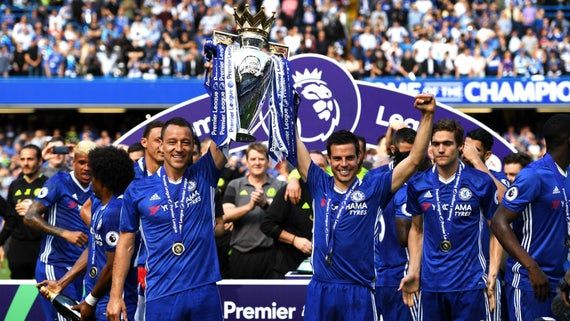The euphoria of lifting the FIFA Club World Cup trophy is undoubtedly a significant milestone for Chelsea Football Club. Crowned champions of the world, the sentiment within the camp, eloquently articulated by young Levi Colwill, suggests an inherent Chelsea identity: a relentless pursuit of the sport`s highest honors. This recent triumph, particularly the dominant performance against Paris Saint-Germain, hints at a latent capability within Enzo Maresca`s squad. However, the path from sporadic brilliance on the global stage to sustained excellence in the demanding crucible of the Premier League is paved with complex challenges and strategic decisions.
The Lure of the Cup vs. The Grind of the League
Chelsea`s commanding victory over PSG in the Club World Cup was a masterclass in tactical execution: aggressive, organized, and fearless. It was the kind of performance that, if replicated consistently over a 38-game season, could indeed propel any team to the pinnacle of domestic football. Yet, herein lies the fundamental paradox. The very reason this performance was so celebrated was its atypical nature compared to their Premier League campaign. Last season, Chelsea found themselves trailing Liverpool by a significant 15 points, navigating a scramble for a top-five position rather than engaging in a serious title challenge.
Their Premier League statistics paint a clear picture. While a respectable third-best defensive record of 43 goals conceded suggests solidity, it pales when contrasted with a relatively modest 64 goals scored. For a title aspirant, the defensive resilience must be truly elite to compensate for any offensive shortcomings. Furthermore, their expected goal difference (xGD) of 21.16 was less than half that of Liverpool and notably behind an injury-afflicted Arsenal, indicating that their underlying performance metrics were not those of a top-tier contender.
The Echoes of Cup Runs: Fortune or Form?
Cup competitions often provide an amplified narrative of a team`s progression. Chelsea’s Conference League romp and their route to Club World Cup glory, while impressive in their culmination, did benefit from some fortuitous circumstances. Benfica eliminating Bayern Munich, and then Al-Hilal and Fluminense (a team Opta rated as comparable to Coventry City or Elche) clearing the path of Manchester City and Inter Milan, simplified their journey to the final. This isn`t to diminish the merit of their ultimate victory over PSG, which was earned with genuine quality, but rather to contextualize the narrative of an unstoppable force.
Todd Boehly`s assessment that “The boys have shown that they are a force to be reckoned with” after the Club World Cup is understandable. Such moments breed confidence and inject momentum. The real question, however, is whether this momentum can genuinely bridge the considerable gap that separates cup glory from the relentless consistency required for Premier League success, especially after a five-week break before the new season.
Recruitment: A Strategic Crossroads
Chelsea`s transfer strategy under the current ownership has largely focused on acquiring high-potential young talent. While players like Moises Caicedo and Cole Palmer have shown flashes of brilliance, forming a strong midfield anchor and creative spark respectively, questions persist about the immediate impact of certain acquisitions. Joao Pedro`s modest goal return and xG numbers in the Premier League, even after a bright start stateside, suggest he is yet to consistently deliver at the desired level. Similarly, the statistical comparison between Noni Madueke and Jamie Gittens, the latter effectively replacing the former, implies a lateral move rather than a significant upgrade in a position where Chelsea has historically sought consistency.
This approach, focused on long-term development, might be a sound financial model, but it arguably postpones the immediate elevation to title contention. With the Club World Cup prize money in hand, Chelsea possesses an opportunity to deviate from the established model. Imagine a scenario where they invest in a truly elite, proven striker of the Victor Osimhen caliber, or anchor their defense with a world-class center-back, perhaps even acquiring a top-tier goalkeeper. Such strategic injections of star quality could provide the immediate uplift required to challenge the established Premier League elite, transforming promising potential into championship-winning pedigree.
The Path Forward: From Potential to Preeminence
Chelsea possesses a robust core. Beyond Caicedo and Palmer, talents like Reece James, Marc Cucurella, and Enzo Fernandez provide foundational quality. The pieces are largely there for a team that can compete at a high level. Yet, the journey from being a team that can occasionally dismantle European champions to consistently being the best in their homeland is arduous. It demands more than just flashes of brilliance; it requires a sustained period of high-level performance, robust squad depth, and perhaps, a strategic shift in recruitment that prioritizes immediate, proven impact alongside long-term development.
The Club World Cup title is a significant achievement, a testament to the club`s enduring ambition and the raw talent within its ranks. However, the true measure of Chelsea`s progress under Maresca will not be found in a solitary cup run, but in their ability to translate that global triumph into domestic dominance. Only when their atypical brilliance against the likes of PSG becomes their consistent standard in the Premier League will the “champions of the world” truly stake their claim as champions of England.









